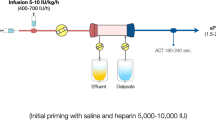Summary
Acute renal failure (ARF) mostly occurs as part of a multiorgan failure syndrome and is observed in 4–16% of intensive care unit (ICU) patients. 50–70% of these patients with ARF have to be treated with renal replacement therapy. In most cases an effective anticoagulation is necessary to prevent frequent clotting of the extracorporeal systems. This may expose the critically ill patients to a substantially high bleeding risk. Several anticoagulation methods have been developed in order to reduce hemorrhagic complications during extracorporeal circulation. Heparininduced thrombocytopenia (HIT) type II is a deleterious side effect of heparin treatment, which requires a specialized anticoagulation regimen to ensure a safe and effective extracorporeal treatment.
In this paper the anticoagulation methods available for these high-risk ICU patients are reviewed. Recommendations are given for the appropriate selection of the anticoagulation.
Zusammenfassung
Das akute Nierenversagen (ANV) bei Patienten auf Intensivstationen tritt mit einer Häufigkeit von 4–16% fast ausschließlich als Teil eines Multiorganversagens auf. 50–70% dieser ANV müssen einer extrakorporalen Nierenersatztherapie zugeführt werden. Zentrales Problem bei der Behandlung mit Nierenersatzverfahren ist der thrombotische Verschluss des extrakorporalen Kreislaufs, der durch eine effektive Antikoagulation verhindert werden kann.
Allerdings werden die zumeist blutungsgefährdeten kritisch kranken Patienten hierbei einem erheblichen antikoagulanzienbedingten Morbiditätsrisiko ausgesetzt, das in bestimmten klinischen Situationen den Einsatz spezieller Antikoagulationsverfahren erforderlich machen kann.
Patienten mit einer Heparininduzierten Thrombozytopenie (HIT) Typ II, die zu schweren thromboembolischen Komplikationen neigen, stellen ebenfalls besondere Anforderungen an das Antikoagulationsregime bei der Nierenersatzbehandlung.
Im Rahmen dieser Übersichtsarbeit werden die speziellen Antikoagulationsverfahren diskutiert, die derzeit für diese intensivmedizinischen Problempatienten zum Einsatz bei der Nierenersatzbehandlung verfügbar sind.
Similar content being viewed by others
Author information
Authors and Affiliations
Additional information
Eingegangen: 11. März 2003, Akzeptiert: 7. April 2003
Correspondence to Dr. med. Rolf Dario Frank
Rights and permissions
About this article
Cite this article
Frank, R., Kierdorf, H. Spezielle Antikoagulationsverfahren für die Nierenersatztherapie in der Intensivmedizin. Intensivmed 40, 382–391 (2003). https://doi.org/10.1007/s00390-003-405-0
Issue Date:
DOI: https://doi.org/10.1007/s00390-003-405-0




